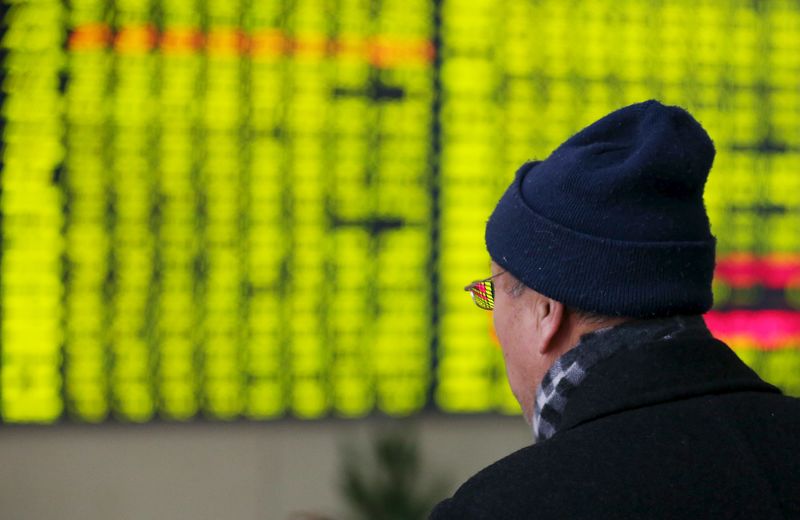By Pete Sweeney and Lu Jianxin
SHANGHAI (Reuters) - China guided its yuan currency higher on Monday, and offshore it surged against the dollar, spurred by what traders called aggressive intervention by Beijing, although Chinese stocks tumbled again as doubts persisted over policymakers' intent.
Perceived mis-steps by China's authorities have stoked concerns in global markets that Beijing might lose its grip on economic policy, even as the country looks set to post its slowest growth in 25 years.
A 1.5 percent depreciation in the yuan since the start of 2016, following a 4.7 percent weakening in 2015, had raised alarm among some trade rivals that China was risking a "currency war" of competitive devaluations.
The yuan's rally could help temper those fears, but it failed to stop investors selling Chinese shares.
The Shanghai Composite Index and the CSI300 index ended down more than 5 percent after a 10 percent plunge last week that triggered a global sell-off of riskier assets.
Tapas Strickland, an economist at National Australia Bank, said "indecisiveness and lack of transparency" was exacerbating market uncertainty.
"Understandably, amidst this global markets are selling Chinese policymakers' ability to control their economy."
The People's Bank of China set the mid-point for the yuan at 6.5626 per dollar, firmer than Friday's fix and substantially stronger than the spot yuan's previous unofficial close of 6.5938. The yuan is allowed to stray no more than 2 percent either side of the mid-point.
The PBOC had also set a stronger daily guidance rate for the yuan on Friday, following a sequence of eight weaker fixes that culminated in the biggest one-day drop in five months last Thursday.
"Different signals about FX policy have wrong-footed market participants, and we are wary in believing that an immediate calmness will soon emerge," wrote Paul Mackel, head of emerging markets FX research at HSBC, in a note.
"In this context, we expect yuan volatility to remain high, while depreciation pressures are likely to remain strong."
OFFSHORE INTERVENTION
The spot yuan strengthened to 6.5756, while the offshore yuan gained around 1 percent to 6.6200, narrowing the spread between the two to under 0.7 percent. The spread, which stretched to more than 2 percent last week, was complicating Beijing's struggle to stop capital flowing out of the slowing Chinese economy.
The narrowing spread appeared in part to be down to offshore buying by China's central bank, traders and analysts said, which was draining the supply of offshore yuan and in turn pushing offshore yuan interbank borrowing rates in Hong Kong (HIBOR) to record highs.
A former head of international payments at China's foreign exchange regulator urged investors not to be alarmed by foreign institutions "talking down" the yuan, saying the currency remained stable against most currencies, even though it was down against the dollar, the official Economic Daily reported on Monday.
Beijing launched the RMB index last month, which weights the yuan's exchange rate against a basket of trade-related currencies, a move that will eventually loosen the currency's link to the greenback.
Ma Jun, the PBOC's chief economist, said that the central bank planned to keep the yuan basically stable against a basket of currencies, and fluctuations of the Chinese currency against the U.S. dollar would increase.
Zhou Hao, senior emerging markets economist for Asia at Commerzbank AG (DE:CBKG), said the last two days' fixes did suggest that the central bank wanted to hold back the pace of yuan depreciation as the RMB index dropped to below 100.
"We still need some time to check the credibility of China's new currency basket," he added.
"The Chinese authorities clearly want to signal that it will not be a one-way trade in the renminbi," said London-based Rabobank currency strategist Jane Foley.
"But most people would recognize that were you to take away the interventions it is a currency that would fall."
Indeed, Goldman Sachs (N:GS) revised its yuan forecasts for the coming year sharply lower to 7.00, and to 7.30 for 2017.
Chinese markets have had a tortuous start to the year, buffeted by the falling yuan, two days of stock exchange suspensions last week, and weak factory and service sector activity surveys.
All of which raised anxieties ahead of China trade data on Wednesday, which are expected to show further declines in exports and imports, underlining the parlous state of world trade flows.
Figures out over the weekend showed Chinese consumer inflation stuck at a subdued 1.6 percent in December, while producer prices were down a steep 5.9 percent on the year - a deflationary pulse that is being felt across the globe.
In a research note dated Jan. 8, Moody's Investors Service put the market turmoil down to an inherent tension between Beijing's attempts to reform its economy and give a greater role to market forces while maintaining economic and social stability.
"Further financial market volatility is likely," it said.
